|
|
|
Sort Order |
|
|
|
Items / Page
|
|
|
|
|
|
|
| Srl | Item |
| 1 |
ID:
178139
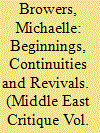

|
|
|
|
|
| Summary/Abstract |
This article examines some of the first translations of Gramsci into Arabic by young, New Left figures associated with a short-lived group called “Socialist Lebanon.” Thinking à la Edward Said about the undertaking of translations of ideas from one context to another and one language to another as a potentially productive act of beginning, I argue that these first translations, undertaken as part of a revolutionary praxis of young, militant intellectuals, not only reveal some of the limitations and possibilities in the development of a Gramscian analysis of Lebanese politics. Rather, their efforts were central to the formation of a New Arab Left and the strands of those beginnings not only are detected in the later work of several of these activist-translators, even after they had moved beyond militant politics, but also remain visible in later revolutionary praxis in the region. By foregrounding the way in which each subsequent “Gramsci boom” (in the 1990s and after 2010) exists in relationship to an ongoing revolutionary praxis that reads and translates the Arab Left anew, I also seek to provide evidence of what Michele Filippini refers to in this issue as an “Arab provincialization” of Gramscian thought and what I prefer to highlight as a continuous tradition of Arab Left revolutionary praxis.
|
|
|
|
|
|
|
|
|
|
|
|
|
|
|
|
| 2 |
ID:
178138
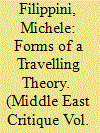

|
|
|
|
|
| Summary/Abstract |
Since 2000, Gramscian concepts have been undergoing an unprecedented process of dissemination, and this process has occurred along two specific axes: The geographic axis and the disciplinary axis. This process, which is also a hybridization resulting in political innovation, often has been interpreted in terms of fidelity/infidelity to Gramsci’s ideas, and as a result has been interpreted as somewhat of a degenerative process. In contrast, my analysis focuses on the transit of Gramscian theory, that is, on what ideas transit, on how they transit, and why they transit rather than starting with a presupposed ‘original’ theory or the arrival points of ‘corrupted’ or ‘translated’ theory. By looking beyond an essentialist notion of his theory, this inquiry into Gramscian concepts ends up discussing the problems of contemporary history and politics rather than simply the revival of interest in a Sardinian Marxist.
|
|
|
|
|
|
|
|
|
|
|
|
|
|
|
|
| 3 |
ID:
178137
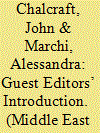

|
|
|
|
|
| Summary/Abstract |
This Special Issue is based on an academic collaboration going back to a conference held at the Università degli Studi di Bari in Italy, on 30 November and 1 December 2017, and entitled ‘Gramsci in the Arab World.’ The conference organizers were Gennaro Gervasio, Patrizia Manduchi and Alessandra Marchi in collaboration with the Centro Interuniversitario di Ricerca per gli Studi Gramsciani, the Gramsci Foundation of Italy, the GramsciLab at the University of Cagliari, and the International Gramsci Society (IGS). It marked the 80th anniversary of Antonio Gramsci’s death. The longest period of Gramsci’s incarceration (June 1928–November 1933) was in Turi, a prison not far from the conference site. Delegates were able to view a selection of Gramsci’s actual prison notebooks, which his sister-in-law, Tatiana Schucht (d. 1943), successfully saved from prison. These provided us a vivid encounter with the traces and intellectual results of struggles from an Italian and European past, an encounter that underlined connections with a Middle East and North Africa beset with political incarceration, problems of revolutionary leadership, counter-revolution, proto-fascism, state violence, colonisation, socioeconomic crisis, and right wing populism.
|
|
|
|
|
|
|
|
|
|
|
|
|
|
|
|
| 4 |
ID:
178141


|
|
|
|
|
| Summary/Abstract |
Starting from a critique of the core thesis in Nazih Ayubi’s Over-stating the Arab State (1995) that Arab states are “feeble” because they lack “hegemony” in the Gramscian sense, this article postulates that rule based on coercion alone is not sustainable beyond exceptional periods. It shows how Arab regimes have been deploying the whole range of hegemonic tools, including buying consent (corruption) and artificially inflating it (fraud). Whereas Ayubi expressed the view that “feebleness” was both a reason and a further cause behind the Arab regimes’ inability to implement the neoliberal restructuring of their economies, this article maintains that it is an erosion in the hegemonic aptitude of regional governments due to the socioeconomic consequences of their implementation of neoliberal recipes that set the scene for the revolutionary shockwave of the Arab Spring. The article also shows how Arab regimes have reacted to the shockwave by an intensified resort to their traditional tools combined with the Hobbesian covenant on the backdrop of regional civil wars. Yet, as recent upheavals in Sudan and Algeria show, there also are limits to this legitimation stratagem.
|
|
|
|
|
|
|
|
|
|
|
|
|
|
|
|
| 5 |
ID:
178140


|
|
|
|
|
| Summary/Abstract |
This article explores how the Arab Marxist, Mahdi Amel (1936–1987), conceptualized hegemony in a colonial and sectarian context. I explore Amel’s articulation of ideology as class struggle in relation to Gramsci and other leftist intellectuals of his generation. My aim is to expand our understanding of how hegemony is transformed when it travels into anti-colonial, Arab Marxist thought in general and its Lebanese communist variant in particular. The first part of the article looks at Amel’s articulation of Arab bourgeois hegemony under colonialism and its manifestation in political rather than civil society. The second part details Amel’s theorization of sectarian bourgeois hegemony in Lebanon. In Amel’s thought, the relationship between class, sect and state, which I explore, gave rise to a chronic and sectarian hegemonic crisis that has haunted the Lebanese bourgeoisie from the time of independence until the present.
|
|
|
|
|
|
|
|
|
|
|
|
|
|
|
|
| 6 |
ID:
178142
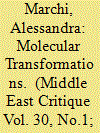

|
|
|
|
|
| Summary/Abstract |
The increasing interest in Antonio Gramsci’s thought constitutes an important source of inspiration in the study of the Middle East and North Africa, particularly in the post-2011 Arab uprisings period. The popularity of the Italian Marxist thinker is to be found in the original applications and uses of Gramscian categories, which have given rise to a growing secondary literature, especially outside Italy and Europe, beyond Gramsci’s immediate background and beyond the context of his own historical and political analysis. The revolutionary moment of 2011, the crisis of hegemony, and thus the crisis of ‘the State as a whole’ (stato integrale), is present in different ways in Arab countries, where many groups within civil society live, work, compete and protest tirelessly. This article draws attention to the less explored Gramscian concept of the “molecular” and argues for the importance of reading molecular, even fragmented, ways to resist the manufacturing of consent and the dominant hegemony during revolutionary moments, such as the pre- and post-2011 periods. The concept of the ‘molecular’ (molecolare) is fundamental to shedding light on the potentially transformative implications of everyday contentious actions and helps us to scrutinise what kind of hegemony is possible in Arab-Mediterranean countries today. Furthermore, Gramsci enables us to confront multiple, singular experiences of ‘others’ – which already are shaping contemporary history in different world regions while being intertwined with global history. This article shows how the theoretical, methodological and political potential of Gramscian interpretations is vital to – and can be enriched and renewed by – a promising, ongoing interdisciplinary dialogue.
|
|
|
|
|
|
|
|
|
|
|
|
|
|
|
|
| 7 |
ID:
178143
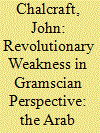

|
|
|
|
|
| Summary/Abstract |
This article sets out a Gramscian perspective on revolutionary weakness in the MENA. It aims not at a top-down analysis of how activists were crushed, but at a bottom-up analysis evaluating activist activity. Drawing on a reading of Gramsci, fieldwork in Egypt, and recent research on MENA protest, it adopts a Gramscian concept of transformative activity and applies it to the MENA since 2011. It argues that the basic elements of transformative activity in Gramsci include subaltern social groups, conceptions of the world, collective will, organisation, strategy/tactics, and historical bloc. It argues that transformative activity involves the organic articulation of these distinct moments in a complex, differentiated unity. On the basis of this view, the article shows how sense can be made of revolutionary weakness in the MENA since 2011 through a critical analysis of problems in the organic articulation of revolutionary mobilisation.
|
|
|
|
|
|
|
|
|
|
|
|
|
|
|
|
|
|
|
|
|